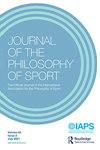What do players do in a game? A Habermasian perspective
IF 1.7
3区 哲学
Q3 ETHICS
引用次数: 0
Abstract
ABSTRACTBy adopting Habermas’ communicative theory, this paper categorizes players’ actions into four elements. The strategic action involves players manipulating each other within the framework of a gameFootnote1; normative action is manifested in following the rules and the underlying ethos; dramaturgical action emerges through the players’ deliberate presentation of themselves to both participants and spectators; and communicative action reveals the purpose of a game as a way of being. The conceptualization of game actions leads to a qualitative redefinition of the perfect game, which enables a greater understanding of the game, its participants, and human excellence. As such, this paper’s significance lies in the proposal that the Habermasian perfect game is a potential solution to Suits’ puzzle about what type of games can be played in his Utopia.KEYWORDS: Habermastheory of communicative actionperfect gameUtopia Disclosure statementNo potential conflict of interest was reported by the authors.Notes1. In this article, we employ the terms ‘game’ and ‘sport’ interchangeably. However, when we use the term ‘sport’ in this context, we are specifically referring to sports of the game-type variety. Besides, we acknowledge the significance of physicality in sports due to the inherent embodiment of humans, but we haven’t dealt with the issue if the physicality makes any difference to the game playing analysis, because a comprehensive discussion of this aspect would require a separate paper due to its depth and complexity.2. Sport serves as a mirror of society, albeit not in a one-dimensional manner. It does more than merely reflect societal aspects; in its finer moments, it assumes the role of a model for effective communication and a societal ideal. It embodies a dual nature, transcending the ordinary, presenting itself as both a commendable exemplar and occasionally, regrettably, a showcase of human behavior that surpasses and falls short of what we encounter in our day-to-day interactions.3. With respect to gamesmanship, noted above, it may be argued that the ethos or spirit of particular games tolerates greater or lesser degrees of gamesmanship. Thus, while gamesmanship may superficially be sent as respecting the rules and not the spirit of the sport, this is an over-simplification. In practice, to participate in certain sports may entail that the players accept gamesmanship as part of the culture and spirit of that sport. The tolerance of sledging (trash-talking) in professional cricket is a case in point.4. We are arguing that on one level sporting action is akin to language (it has syntax and thus meaning), but the point is that this is not ordinary, spoken language. It is akin to the claim that Nelson Goodman makes in Languages of Art – Arts are languages, just not everyday spoken languages.5. Habermas’ discourse ethics emphasizes that moral norms should be acceptable to all individuals in a society if they engage in a fair and open dialogue. In games, the common acceptance of and respect for constitutive rules allows for a shared engagement, a shared form of life. This is itself a moral achievement that involves cooperation, respect, and social interaction.6. We have argued above that deception (for example in the form of feints) and even gamesmanship are legitimate components of a game. The judgment that a game has been played perfectly is thus made within the context of the agreed interpretation and construction of the meaning (and thus ethos) of the game. A perfect game, in some sports, might thus involve (perhaps at least creative and witty) gamesmanship.7. A professional foul would be a paradigmatic example of play that respects the rules – as the foul is not concealed – without respecting the ethos of the game and its communicative nature.Additional informationFundingThis work was supported by National Social Science Fund of China (22BTY005) and China Scholarship Council (202108515067).玩家在游戏中做什么?哈贝马斯的观点
摘要本文运用哈贝马斯的交际理论,将玩家的行为分为四个要素。战略行动包括玩家在游戏框架内相互操纵。规范行为表现为遵循规则和内在精神;戏剧性的动作通过玩家有意地向参与者和观众展示自己而出现;交流行为揭示了游戏作为一种存在方式的目的。游戏行动的概念化导致了对完美游戏的定性重新定义,这让我们能够更好地理解游戏、参与者和人类的卓越。因此,本文的意义在于提出哈贝马斯式的完美博弈是解决金装律师关于在他的乌托邦中可以玩什么类型的博弈的潜在解决方案。关键词:哈贝马斯交际行为理论完美游戏乌托邦披露声明作者未报告潜在利益冲突。在本文中,我们交替使用“游戏”和“运动”这两个术语。然而,当我们在这种情况下使用“运动”一词时,我们特别指的是游戏类型的运动。此外,我们承认身体在体育运动中的重要性,因为人类的内在体现,但我们没有处理身体是否对游戏分析有任何影响的问题,因为由于其深度和复杂性,全面讨论这方面将需要单独的论文。体育是社会的一面镜子,尽管不是单向的。它不仅仅反映了社会方面;在良好的时刻,它承担了有效沟通和社会理想的典范作用。它体现了一种双重性质,超越了平凡,将自己呈现为一个值得赞扬的典范,偶尔,令人遗憾的是,它展示了人类行为,超越了我们在日常交往中遇到的,但又达不到我们的标准。关于上文提到的游戏技巧,我们可能会认为特定游戏的风气或精神能够容忍或多或少程度的游戏技巧。因此,虽然游戏技巧可能表面上被认为是尊重规则而不是运动精神,但这是一种过度简化。在实践中,参加某些运动可能需要运动员接受游戏技巧作为该运动文化和精神的一部分。在职业板球比赛中容忍说脏话就是一个很好的例子。我们认为,在某种程度上,体育运动类似于语言(它有语法,因此有意义),但重点是,这不是普通的口语。这类似于纳尔逊·古德曼在《艺术的语言》中所说的——艺术也是语言,只是不是日常的口语。哈贝马斯的话语伦理学强调,如果一个社会中的所有个体都参与公平和公开的对话,那么道德规范应该是可以接受的。在游戏中,对基本规则的普遍接受和尊重促成了一种共同参与,一种共同的生活形式。这本身就是一种涉及合作、尊重和社会互动的道德成就。我们在上面已经讨论过,欺骗(游戏邦注:例如佯装)和游戏技巧都是游戏的合法组成部分。因此,判断一款游戏是否玩得很完美是在对游戏意义(以及精神)的一致解释和构建的背景下做出的。因此,在某些运动中,一场完美的比赛可能包括(至少是创造性和机智的)游戏技巧。职业犯规是尊重规则的典型例子,因为犯规是不隐藏的,而不尊重比赛的精神和它的交流性质。本研究得到国家社科基金(22BTY005)和中国留学基金委(202108515067)资助。
本文章由计算机程序翻译,如有差异,请以英文原文为准。
求助全文
约1分钟内获得全文
求助全文
来源期刊

Journal of the Philosophy of Sport
Multiple-
CiteScore
1.90
自引率
14.30%
发文量
24
期刊介绍:
The Journal of the Philosophy of Sport (JPS) is the most respected medium for communicating contemporary philosophic thought with regard to sport. It contains stimulating articles, critical reviews of work completed, and philosophic discussions about the philosophy of sport. JPS is published twice a year for the International Association for the Philosophy of Sport; members receive it as part of their membership. To subscribe to either the print or e-version of JPS, press the Subscribe or Renew button at the top of this screen.
 求助内容:
求助内容: 应助结果提醒方式:
应助结果提醒方式:


